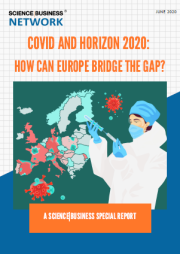The pandemic is causing huge disruption to the EU’s flagship research programme. Which steps can Europe take to help its R&D communities navigate through the crisis? A new Science|Business report explores the options
Get your free copy

The COVID-19 pandemic is creating havoc within Horizon 2020, the EU’s existing Framework Programme for research and innovation. It is forcing the European Commission to rethink spending priorities for a budget of around €14 billion this year, and in parallel it is dynamiting the carefully-laid plans of many H2020 projects and grantees worldwide.
Unsurprisingly, the ripple effects from COVID are being felt throughout the system. Many beneficiaries are struggling to pay for extended staff contracts to complete projects. National agencies are frustrated with state aid restrictions on financing companies in difficulty. Industry contributions to current R&D partnerships and innovation clusters are at risk. Meanwhile, the lockdown of campuses and laboratories is curtailing the EU’s mobility-based schemes, hindering international cooperation and reducing career development opportunities for young scientists.
Decisions taken today in response to these upheavals will matter for some time into the future. Changes to grant terms and conditions will apply to projects running until at least 2023 – and potentially beyond, if the EU cannot agree on its new multi-year budget and recovery plan.
In this special report, therefore, we suggest a range of options that could help the Commission minimise the short-term damage, and even produce longer term benefits: from increased flexibility in grant agreements and cost allocations, to improved synergies between EU and national enterprise financing schemes. We explore new models for managing mobility and R&D training, enhancing digital infrastructures, and improving the tools for virtual R&D cooperation. And we look at ways in which ‘moonshots’ and open science can help to intensify collaborations as well as find solutions for COVID-19 and other societal challenges.

 A unique international forum for public research organisations and companies to connect their external engagement with strategic interests around their R&D system.
A unique international forum for public research organisations and companies to connect their external engagement with strategic interests around their R&D system.